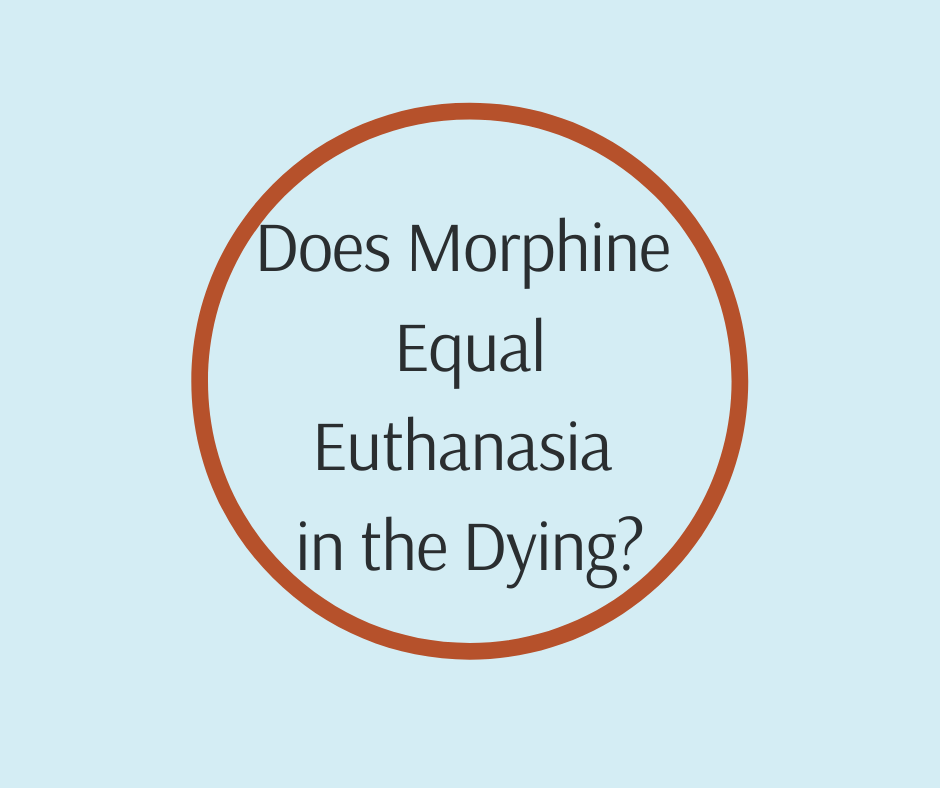I have written many articles on morphine yet I repeatedly get this question. What that tells me is how big the fear is, and how lacking the knowledge, around the use of morphine.
Here are my thoughts on the use of morphine at the end of life. First and foremost dying in itself is not painful. Disease causes pain. If the disease history of the dying person is one of experiencing pain, than we must treat that pain with whatever it takes and however much it takes to keep the person comfortable until their very last breath.
There are diseases that do not cause pain. If the person's disease history is one of no pain then there is no reason to give them morphine just because they are dying. UNLESS breathing is an issue, not the normal puffing and start and stop breathing that occurs weeks and days before death, but severe labored breathing. Then a small, small, amount of morphine will often ease the difficulty in breathing. We must remember that taking in oxygen by breathing is one of the ways the body lives. If it is preparing to die then breathing and air intake will be effected. That is part of the NORMAL dying process.
I had a friend who drank an entire bottle of liquid morphine in a suicide attempt. He had no previous use of the drug, so its full effect acted on his body. He slept a long time but did not die. A different person (body size, age) might have died. But my friend didn’t . This tells me our bodies can take a lot of morphine and not stop breathing.
I will ask the obvious question here: If, when someone is in the dying process (days, hours or weeks before death), the morphine dosage were to make them die, is that really a consideration? Yes, I think it is. No caregiver wants to live with the knowledge that the medication they administered made their patient die (I think this is the center of caregivers fear of narcotic administration).
In the days to hours before death a person’s body is shutting down. Nothing works right. Circulation is slowing down (mottling, very low 60/40 blood pressure). It is circulation that makes medications work. Medications taken by mouth, skin, or rectum take a long time to be absorbed into the blood stream. Even longer if the circulation is compromised which it is when a person is dying. If you give a narcotic other than through an IV (let’s hope most people are not getting IV’s in the days to hours or a week before their death from disease) it is going to take a VERY long time for this medication to work.
If you give morphine to someone who is in the dying process hours before death and they die shortly after you administer the medication they most probably did not die from the drug. They would have died with or without the narcotic.
All of the above said, I am going to give you something to think about. The key to a gentle death is to relax. All we have to do to slip out of our body is to relax. Fear, pain, and unfinished business are what make our “labor” to leave this world longer. If someone is very agitated (fearful) and/or has a disease history of pain then giving them medications that can reduce those occurrences can be very beneficial to allowing the person to relax and have a gentle passing from this world to the next.
Something More About "Dangers of Morphine for the Dying?"...
Hospices and Palliative Care Centers are using my dvd, NEW RULES for End of Life Care to educate families on how and why morphine may be used with a loved one why is dying. It is so common for nurses to hear families say, "I don't want Mom to get addicted", and not allow use of this helpful tool. NEW RULES... can help to make this conversation so much easier.








20 comments